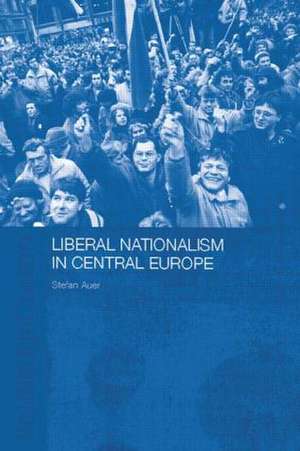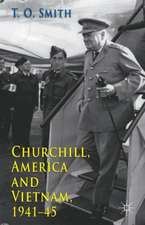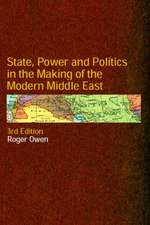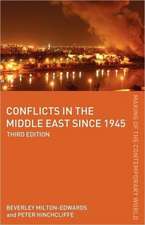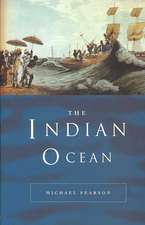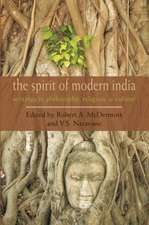Liberal Nationalism in Central Europe
Autor Stefan Aueren Limba Engleză Paperback – 6 apr 2006
| Toate formatele și edițiile | Preț | Express |
|---|---|---|
| Paperback (1) | 485.40 lei 6-8 săpt. | |
| Taylor & Francis – 6 apr 2006 | 485.40 lei 6-8 săpt. | |
| Hardback (1) | 1332.81 lei 6-8 săpt. | |
| Taylor & Francis – 22 ian 2004 | 1332.81 lei 6-8 săpt. |
Preț: 485.40 lei
Nou
Puncte Express: 728
Preț estimativ în valută:
92.88€ • 101.30$ • 78.32£
92.88€ • 101.30$ • 78.32£
Carte tipărită la comandă
Livrare economică 24 aprilie-08 mai
Preluare comenzi: 021 569.72.76
Specificații
ISBN-13: 9780415406123
ISBN-10: 0415406129
Pagini: 248
Dimensiuni: 156 x 234 x 13 mm
Greutate: 0.36 kg
Ediția:1
Editura: Taylor & Francis
Colecția Routledge
Locul publicării:Oxford, United Kingdom
ISBN-10: 0415406129
Pagini: 248
Dimensiuni: 156 x 234 x 13 mm
Greutate: 0.36 kg
Ediția:1
Editura: Taylor & Francis
Colecția Routledge
Locul publicării:Oxford, United Kingdom
Public țintă
Postgraduate and ProfessionalNotă biografică
Stefan Auer is a lecturer in European politics and societies at the Dublin European Institute, University College Dublin. Prior to this, he studied at the University of Melbourne, and at Universities in Slovakia and Germany. His research interests include the challenges of postcommunist transition and aspects of political theory.
Cuprins
1. Nationalism in Central Europe2. Reflections on Minority Rights in Central Europe3. Nationalism in Poland4. Nationalism in the Czech Republic5. Nationalism in Slovakia6. Conclusions
Recenzii
'A fine and useful book; his thesis, that nationalism, when liberal, isn't a threat to democracy or minorities, and actually helps the nation building, is an important counter to the blanket condemnations of nationalism by other writers.' - Professor Andrew Oldenquist, Ohio State University
'The book by Stefan Auer belongs to the very rare kind in the studies of East Central Europe. It is based on first-hand knowledge of the problems of postcommunist societies and shows deep understanding of the intellectual and political debates, which have been going on in East Central Europe since 1989. It makes many very important points that could contribute to revision of some widespread simplistic convictions about nationalism in that region. Anyone who is interested in East Central Europe and in the problems of nationalisms, studied without prejudices and ideological bias, should read this book.' - Professor Zdzislaw Krasnodebski, Universitat Berlin
'Awarded the 2005 UACES Book Prize for having made "the most substantial and original contribution to the knowledge in the area of European Studies."- University Association for Contemporary European Studies, UK
'I can certainly recommend this book as being informative in content, novel in approach, and extremely useful as a reference for nationalism scholars.' - Slavic Review
'There is much to applaud [in this book]. Stefan Auer demonstrates a deep understanding of the complexity of politics in his three cases.' - Nations and Nationalism
'It convincingly repudiates the traditional and popular views on nationalism in Central Europe...[The book] is a well researched and intellectually stimulating book that is to be valued for its qualities as an eye-opener. Auer deserves praise for making us aware of the fact that there is at least a possiblity that liberal nationalism may further democratic consolidation.' - Europe-Asia Studies
'This book brings an important nuance in the thinking about nationalism in central Europe...[It] provides an excellent basis for further innovative research in promoting the thesis that nationalism, when liberal, is not a threat to democracy or minorities, but helps nation building.' - West European Politics
'[R]ich in scope, bold in form, ambitious, closely argued, lucidly and convincingly written... a landmark study.' - Leonidas Donskis, Studies in East European Thought, 59, 2007
University Association for Contemporary European Studies, UK
Awarded the 2005 UACES Book Prize for having made "the most substantial and original contribution to the knowledge in the area of European Studies."
Reviews
"A fine and useful book; his thesis, that nationalism, when liberal, isn't a threat to democracy or minorities, and actually helps the nation building, is an important counter to the blanket condemnations of nationalism by other writers." - Professor Andrew Oldenquist, Ohio State University
"The book by Stefan Auer belongs to the very rare kind in the studies of East Central Europe. It is based on first-hand knowledge of the problems of postcommunist societies and shows deep understanding of the intellectual and political debates, which have been going on in East Central Europe since 1989. It makes many very important points that could contribute to revision of some widespread simplistic convictions about nationalism in that region. Anyone who is interested in East Central Europe and in the problems of nationalisms, studied without prejudices and ideological bias, should read this book." - Professor Zdzislaw Krasnodebski, Universitat Berlin
"I can certainly recommend this book as being informative in content, novel in approach, and extremely useful as a reference for nationalism scholars."
– Russell F. Farnen, University of Connecticut, Slavic Review, Vol 63, No 3, Fall 2005
"... there is much to applaud in [this book]. Stefan Auer demonstrates a deep understanding of the complexity of politics in his three cases." - Tim Haughton, University College London, Nations and Nationalism, Vol 11, No 3, July 2005
"it convincingly repudiates the traditional and popular views on nationalism in Central Europe. … Liberal Nationalism in Central Europe is a well researched and intellectually stimulating book that is to be valued for its qualities as an eye-opener. Auer deserves praise for making us aware of the fact that there is at least a possibility that liberal nationalism may further democratic consolidation." - Peter Vermeersh, Katholieke Universiteit Leuven, Europe-Asia Studies, Vol 57, No 3, May 2005
"This book brings an important nuance in the thinking about nationalism in central Europe...[It] provides an excellent basis for further innovative research in promoting the thesis that nationalism, when liberal, is not a threat to democracy or minorities, but helps nation building."- Katlijn Malfielt, Katholieke Universiteit Leuven, West European Politics, Vol 28, No 1, January 2005
'The book by Stefan Auer belongs to the very rare kind in the studies of East Central Europe. It is based on first-hand knowledge of the problems of postcommunist societies and shows deep understanding of the intellectual and political debates, which have been going on in East Central Europe since 1989. It makes many very important points that could contribute to revision of some widespread simplistic convictions about nationalism in that region. Anyone who is interested in East Central Europe and in the problems of nationalisms, studied without prejudices and ideological bias, should read this book.' - Professor Zdzislaw Krasnodebski, Universitat Berlin
'Awarded the 2005 UACES Book Prize for having made "the most substantial and original contribution to the knowledge in the area of European Studies."- University Association for Contemporary European Studies, UK
'I can certainly recommend this book as being informative in content, novel in approach, and extremely useful as a reference for nationalism scholars.' - Slavic Review
'There is much to applaud [in this book]. Stefan Auer demonstrates a deep understanding of the complexity of politics in his three cases.' - Nations and Nationalism
'It convincingly repudiates the traditional and popular views on nationalism in Central Europe...[The book] is a well researched and intellectually stimulating book that is to be valued for its qualities as an eye-opener. Auer deserves praise for making us aware of the fact that there is at least a possiblity that liberal nationalism may further democratic consolidation.' - Europe-Asia Studies
'This book brings an important nuance in the thinking about nationalism in central Europe...[It] provides an excellent basis for further innovative research in promoting the thesis that nationalism, when liberal, is not a threat to democracy or minorities, but helps nation building.' - West European Politics
'[R]ich in scope, bold in form, ambitious, closely argued, lucidly and convincingly written... a landmark study.' - Leonidas Donskis, Studies in East European Thought, 59, 2007
University Association for Contemporary European Studies, UK
Awarded the 2005 UACES Book Prize for having made "the most substantial and original contribution to the knowledge in the area of European Studies."
Reviews
"A fine and useful book; his thesis, that nationalism, when liberal, isn't a threat to democracy or minorities, and actually helps the nation building, is an important counter to the blanket condemnations of nationalism by other writers." - Professor Andrew Oldenquist, Ohio State University
"The book by Stefan Auer belongs to the very rare kind in the studies of East Central Europe. It is based on first-hand knowledge of the problems of postcommunist societies and shows deep understanding of the intellectual and political debates, which have been going on in East Central Europe since 1989. It makes many very important points that could contribute to revision of some widespread simplistic convictions about nationalism in that region. Anyone who is interested in East Central Europe and in the problems of nationalisms, studied without prejudices and ideological bias, should read this book." - Professor Zdzislaw Krasnodebski, Universitat Berlin
"I can certainly recommend this book as being informative in content, novel in approach, and extremely useful as a reference for nationalism scholars."
– Russell F. Farnen, University of Connecticut, Slavic Review, Vol 63, No 3, Fall 2005
"... there is much to applaud in [this book]. Stefan Auer demonstrates a deep understanding of the complexity of politics in his three cases." - Tim Haughton, University College London, Nations and Nationalism, Vol 11, No 3, July 2005
"it convincingly repudiates the traditional and popular views on nationalism in Central Europe. … Liberal Nationalism in Central Europe is a well researched and intellectually stimulating book that is to be valued for its qualities as an eye-opener. Auer deserves praise for making us aware of the fact that there is at least a possibility that liberal nationalism may further democratic consolidation." - Peter Vermeersh, Katholieke Universiteit Leuven, Europe-Asia Studies, Vol 57, No 3, May 2005
"This book brings an important nuance in the thinking about nationalism in central Europe...[It] provides an excellent basis for further innovative research in promoting the thesis that nationalism, when liberal, is not a threat to democracy or minorities, but helps nation building."- Katlijn Malfielt, Katholieke Universiteit Leuven, West European Politics, Vol 28, No 1, January 2005
Descriere
This book examines the role of nationalism in post-communist development in central Europe, focusing in particular on Poland, the Czech Republic and Slovakia.
